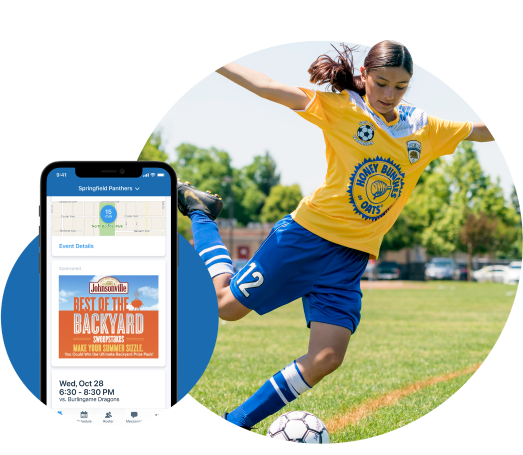Effective Restaurant Marketing Strategies to Reach Families
Learn how to build brand awareness and drive store traffic with youth sports.


Promote your restaurant to families with TeamSnap
TeamSnap empowers restaurants to create authentic relationships with families through youth sports sponsorships and digital media targeting families in the #1 youth sports coordination app. Unlike other marketing channels, we engage families when and where it matters most - at the field, at home, and on the go.
Learn how our partners including Jersey Mikes, Taco Bell, and Black Bear Diner use TeamSnap to reach the Chief Household Officer.
Learn MoreWhat Makes An Effective Restaurant Marketing Strategy?
Restaurant marketing strategies are essential for establishments looking to attract and retain customers in a competitive industry. These strategies encompass a wide range of tactics designed to increase brand awareness, drive foot traffic, and ultimately boost revenue. Successful restaurant marketing strategies often leverage a combination of traditional and digital channels to reach customers effectively.
An effective marketing strategy for a restaurant is one that is tailored to the target audience, utilizes a mix of channels, and aligns with the restaurant's brand and goals.
Examples of Successful Restaurant Marketing Strategies
Social Media Engagement: Restaurants like Chick-Fil-A have leveraged platforms like Instagram and Facebook to showcase their menu items, engage with customers, and promote special offers. By regularly posting high-quality images and engaging content, they have built a loyal following and increased customer engagement.
Local Partnerships: Taco Bell is an example of a restaurant that has partnered with local sports teams and events to increase their visibility within the community. By offering special discounts or hosting events, they have been able to attract new customers and generate buzz around their brand.
Learn more: Team Lyders, a Taco Bell franchisee operating 178 locations across six states, generated a 227% return on investment from their youth sports sponsorships! Read the case study.
Email Marketing Campaigns: Sweetgreen uses targeted email campaigns to promote new menu items, announce special events, and offer exclusive discounts to their subscribers. This personalized approach has helped them nurture customer relationships and drive repeat business.
Sweetgreen's email marketing strategy focuses on personalized and targeted campaigns to engage customers and drive sales.The salad chain collects customer data through its app and website, including order history, location, and preferences. This data allows Sweetgreen to send targeted emails based on the customer's past behavior and preferences.
For example, if a customer frequently orders vegetarian salads, Sweetgreen may send them an email promoting new vegetarian menu items or offering a discount on their next vegetarian order. If a customer hasn't ordered in a while, Sweetgreen may send a re-engagement email with a special offer to entice them back.
Loyalty Programs: Chipotle has implemented a loyalty program, Chipotle Rewards, that incentivizes customers for repeat visits and referrals. This has not only encouraged customers to visit Chipotle often, but has also helped them build a database of loyal customers for future marketing efforts.
Chipotle Rewards allows customers to earn points for every dollar spent at Chipotle. Once customers accumulate enough points, they can redeem them for free food items. In addition to earning points, members of Chipotle Rewards also receive exclusive offers and bonuses, such as free chips and guacamole on their birthdays.
Food Delivery Services: McDonalds is known for its partnership with food delivery service Uber Eats. Customers can use the Uber Eats app to place an order from McDonald's and have it delivered directly to their doorstep. This partnership has allowed McDonald's to reach customers who prefer the convenience of delivery and has helped drive sales for the restaurant chain.
Five Restaurants With Successful Marketing Strategies
The Rainforest Cafe is most notably known for its immersive jungle-themed dining experience. The restaurant uses its unique atmosphere as its driving marketing tool. The restaurant's decor, which includes animatronic animals and simulated rainstorms, creates a memorable and Instagram-worthy dining experience that attracts customers.
Dinner in the Sky–talk about taking dining to new heights, literally! Global experience-and-restaurant, Dinner in the Sky, offers diners the opportunity to enjoy a gourmet meal while suspended in the air by a crane. This unique dining experience has garnered media attention and word-of-mouth buzz, helping to attract customers looking for an unforgettable meal.
The Magic Castle is a private club for magicians and magic enthusiasts, but it also features a restaurant that is open to the public. The restaurant's marketing strategy leverages the allure of magic and mystery, offering diners the chance to enjoy a meal in a unique and enchanting setting.
Heart Attack Grill is known for its over-the-top menu items and tongue-in-cheek branding. Heart Attack Grill has built a reputation for itself as a destination for indulgence at the highest level.
Ninja New York is a restaurant that transports diners to a Japanese village, complete with ninja-themed decor and entertainment. The restaurant's marketing strategy emphasizes the immersive and theatrical nature of the dining experience, appealing to customers looking for something out of the ordinary and many surprises along the way.
These restaurants have successfully differentiated themselves from their competitors by offering unique dining experiences and leveraging their uniqueness as a key part of their marketing strategy.
Interested in 5 local store marketing ideas for restaurants? Read More.
All of these restaurants have achieved successful marketing strategies by creating engaging content and experiences, partnering with locals and the community, targeted messaging, and out-of-the-box service.
Digital Marketing: This Week’s Special
Digital marketing has revolutionized the way restaurants reach and engage with customers. With the rise of social media, online reviews, and mobile technology, restaurants can now connect with customers in new ways. A strong digital marketing strategy for a restaurant may include:
- Social Media Marketing: Engaging with customers on platforms like Facebook, Instagram, and Twitter to promote menu items, share updates, and respond to feedback.
- Search Engine Optimization (SEO): Optimizing your website and online content to rank higher in search engine results, making it easier for customers to find your restaurant online.
- Online Advertising: Using targeted online ads to reach specific demographics or geographic areas, driving traffic to your website or physical location.
- Email Marketing: Sending targeted emails to customers to promote special offers, announce new menu items, or solicit feedback.
- Contextual marketing: Use apps to reach families! Apps, and using phones on-the-go is one of the best ways to reach busy parents.
Restaurant Marketing Ideas To Shape Your Strategy
Incorporating creative marketing ideas into your overall strategy can help set your restaurant apart from the competition. Some effective restaurant marketing ideas include:
Themed Events: Hosting themed events or promotions can create buzz and attract new customers. For example, hosting a "Taco Tuesday" or "Wine and Cheese Night" can appeal to a specific audience and drive traffic to your restaurant.
Collaborations: Partnering with local businesses or influencers can help expand your reach and attract new customers. For example, collaborating with a local brewery to offer a beer pairing menu can attract beer enthusiasts to your restaurant.
Community Involvement: Getting involved in the local community through sponsorships or charity events can help build goodwill and positive brand associations.
Online Reviews and Reputation Management: Encouraging satisfied customers to leave positive reviews online can help boost your restaurant's reputation and attract new customers.
By implementing a comprehensive marketing strategy that includes both traditional and digital tactics, restaurants can effectively reach and engage with their target audience, driving sales and building brand loyalty.